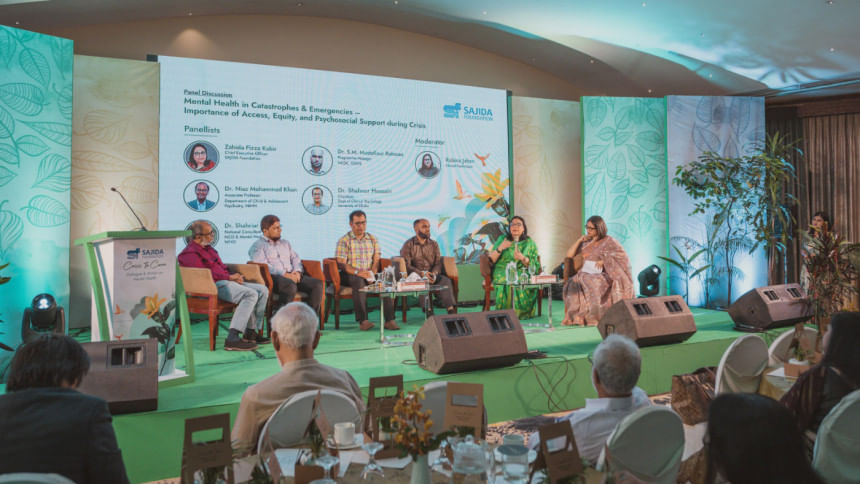Experts have called for the integration of mental health and psychosocial support into Bangladesh's emergency preparedness and response systems to help communities recover faster and strengthen resilience in times of crisis.
They made the remarks at a dialogue titled "Crisis to Care: Dialogue & Action on Mental Health," organised by SAJIDA Foundation on Saturday evening (October 25) in Dhaka to mark World Mental Health Day 2025, observed globally on October 10.
Speakers said that while Bangladesh has made significant progress in disaster and emergency management, psychological support remains underprioritised. The country, with over 170 million people, has an estimated 28 million suffering from mental health challenges.
According to data from the Bangladesh WHO Special Initiative for Mental Health Situational Assessment (2020), there are only 1,525 mental health professionals nationwide — including 260 psychiatrists, 565 psychologists, and 700 nurses — a severe shortfall compared to the population's needs.
The event featured two panel discussions - "Mental Health in Catastrophes & Emergencies – Importance of Access, Equity & Psychological Support During Crisis" and "Pathways & Barriers to Services in Emergencies – Ensuring Mental Health Support in Times of Crisis."
These sessions brought together experts, policymakers, and development practitioners to stress the need for embedding mental health into national disaster response frameworks.
In her opening remarks, Zahida Fizza Kabir, Chief Executive Officer of SAJIDA Foundation, said, "Mental health should not be an afterthought in the event of disasters. It must be integrated into response systems so that appropriate services can be provided whenever and wherever needed."
She also underscored the need for a single regulatory body in mental healthcare, operating under a unified standard operating procedure (SOP) to ensure coordination and better outcomes.
Dr. S.M. Mustafizur Rahman, Program Manager at the Directorate General of Health Services (DGHS), highlighted that only 0.5 percent of the national health budget is allocated to mental health - most of it as institutional expenditure. He called for increased investment, multisectoral collaboration, and decentralised mental health facilities across the country.
Other experts included Dr. Shahanur Hossain (Chairman, Department of Clinical Psychology, University of Dhaka), Dr. Niaz Mohammad Khan (Associate Professor, National Institute of Mental Health), Dr. Shariar Faruque (National Consultant for NCD & Mental Health, WHO), Md. Fazlul Haque (Deputy CEO, SAJIDA Foundation), Syed Md. Nuruddin (Advisor, Plan International), Syeda Samara Mortada (Coordination & Partnerships Analyst, UN Women), and Dr. Dewan Md. Emdadul Hoque (Health Manager, UNICEF).
Participants also explored booths from SAJIDA Foundation's mental health-focused social enterprises — Psychological Health and Wellness Care, Inner Circle, Neuroscience and Psychiatry Hub, and Home and Community Care Limited — along with an inspiring art exhibition, mindfulness session, and a soulful musical performance celebrating resilience and well-being.
Through Crisis to Care, SAJIDA Foundation reaffirmed its commitment to bridging the gap between crisis response and long-term mental health care, advocating a holistic, inclusive approach that prioritises human dignity and psychological resilience.

